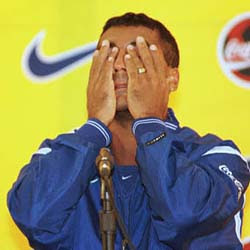Wow, this is better than even most optimistically hoped for: Scripture, the 39 Articles and the 1662 Book of Common Prayer being held up as the confessional basis for the Anglican faith.
I expect quite a bit of gnashing of teeth and ankle biting from the so-called Anglo-Catholics, who outright reject a great deal of the core doctrines of these formularies of Anglicanism.
More importantly, may Anglicanism in the West see reformation and rejuvination from this. It's a shame that such great statements of faith as the 39 Articles and such a wonderful expression of corporate worship as the Book of Common Prayer have been honored only in the breach for the past 100-plus years.
Highlights:
We, the participants in the Global Anglican Future Conference, are a fellowship of confessing Anglicans for the benefit of the Church and the furtherance of its mission. We are a fellowship of people united in the communion (koinonia) of the one Spirit and committed to work and pray together in the common mission of Christ. It is a confessing fellowship in that its members confess the faith of Christ crucified, stand firm for the gospel in the global and Anglican context, and affirm a contemporary rule, the Jerusalem Declaration, to guide the movement for the future. We are a fellowship of Anglicans, including provinces, dioceses, churches, missionary jurisdictions, para-church organisations and individual Anglican Christians whose goal is to reform, heal and revitalise the Anglican Communion and expand its mission to the world.
1. We rejoice in the gospel of God through which we have been saved by grace through faith in Jesus Christ by the power of the Holy Spirit. Because God first loved us, we love him and as believers bring forth fruits of love, ongoing repentance, lively hope and thanksgiving to God in all things.
2. We believe the Holy Scriptures of the Old and New Testaments to be the Word of God written and to contain all things necessary for salvation. The Bible is to be translated, read, preached, taught and obeyed in its plain and canonical sense, respectful of the church’s historic and consensual reading.
4. We uphold the Thirty-nine Articles as containing the true doctrine of the Church agreeing with God’s Word and as authoritative for Anglicans today.
5. We gladly proclaim and submit to the unique and universal Lordship of Jesus Christ, the Son of God, humanity’s only Saviour from sin, judgement and hell, who lived the life we could not live and died the death that we deserve. By his atoning death and glorious resurrection, he secured the redemption of all who come to him in repentance and faith.
6. We rejoice in our Anglican sacramental and liturgical heritage as an expression of the gospel, and we uphold the 1662 Book of Common Prayer as a true and authoritative standard of worship and prayer, to be translated and locally adapted for each culture.
8. We acknowledge God’s creation of humankind as male and female and the unchangeable standard of Christian marriage between one man and one woman as the proper place for sexual intimacy and the basis of the family. We repent of our failures to maintain this standard and call for a renewed commitment to lifelong fidelity in marriage and abstinence for those who are not married.
Mmm, fellowship of confessing Anglicans. Sounds just marvelous!
Full statement here:
http://pbs1928.blogspot.com/2008/06/statement-on-global-anglican-future.html



